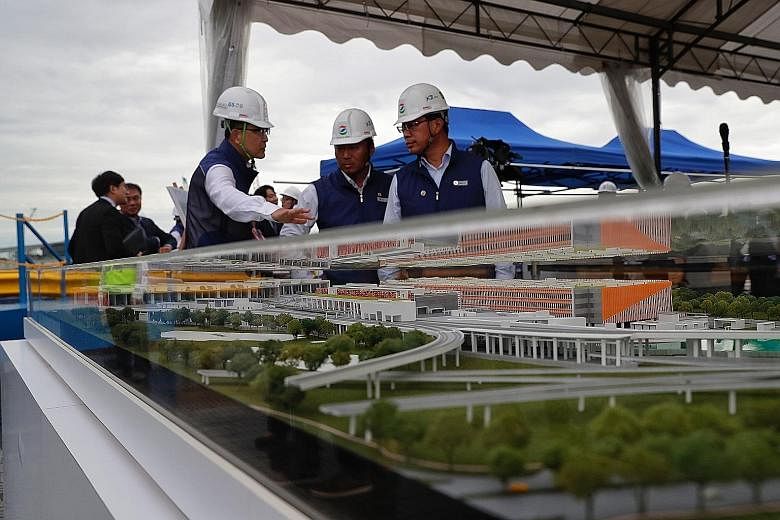Local white-collar workers appear to be shying away from the construction sector, but new policies are in the offing to lure them back.
The proportion of locals taking up jobs for PMETs (professionals, managers, executives and technicians) in the sector has fallen over the past decade, said Mr Zaqy Mohamad, Minister of State for National Development and Manpower.
He said many locals preferred jobs that offer better working environments and less manual work, and employers can readily find less-skilled foreign workers at a lower cost.
But policies may be strengthened to give a strong local core to the sector, as construction demand is expected to remain robust.
Speaking at the BCA-Redas built environment and property prospects seminar yesterday, Mr Zaqy said: "Despite the economic headwinds and global uncertainties, we remain optimistic about construction demand in the coming years."
The Building and Construction Authority (BCA) projects construction demand to be between $27 billion and $34 billion a year from 2021 to 2022, and between $28 billion and $35 billion a year from 2023 to 2024.
"Beyond 2020, we see construction demand strengthening further... supported by major developments such as Changi Airport Terminal 5, developments at Jurong Lake District, the expansion of the two integrated resorts (IRs) - Marina Bay Sands and Resorts World Sentosa - and new MRT lines such as the Cross Island Line," Mr Zaqy said.
The construction sector accounts for about 4 per cent of Singapore's total gross domestic product.
After hitting a five-year high last year, total construction demand - which is the value of construction contracts to be awarded - is expected to be between $28 billion and $33 billion this year.
If the IR expansion projects start earlier than expected, they could boost construction demand this year, BCA chief executive Hugh Lim told reporters yesterday.
"For this year, we haven't factored in contracts arising from IR development. We do know they are on the horizon but they are still working out their timelines for commencing works. If they start earlier than expected, then they will add to the private sector forecast for 2020," he said.
-
4%
Percentage of total gross domestic product the construction sector accounts for in Singapore.
Mr Zaqy said the sector still needs to be anchored by a skilled local workforce at the core.
To that end, he said, the Government is working with the industry to build a pipeline of skilled local graduates and mid-career professionals, particularly in engineering and project management.
"These jobs are core to construction, which we are focusing on to build better career and wage prospects," said Mr Zaqy.
A skills framework that will clearly chart career progression for key job roles in the sector will be launched later this year, he added.
He noted that the BIM (building information modelling) professional conversion programme (PCP), which helps mid-career PMETs acquire skills to switch to the sector, has not been very successful.
"Few firms have taken this up, compared with the PCPs in other sectors such as healthcare and manufacturing. So we will need to work with (the industry) to help more fresh graduates and mid-career professionals enter the sector," he said.
Mr Kenneth Loo, chief operating officer of Straits Construction, said the industry needs change. "It is always perceived as being very demanding. We need to change our practices so that they are in line with what the labour market expects, in order to attract people."
Mr Lim said the BCA is working with firms to work out the best mechanism to help upgrade job seekers crossing over from other sectors to take up new positions in the sector.
"The industry has been in a slow period. Unfortunately, when we introduced the PCP in 2018, output had not picked up yet. But output is now starting to pick up... so we expect that as more firms see projects coming on stream, they will see the need to bring these job seekers on board," he said.
Correction note: This article has been edited to reflect the correct value of total construction demand expected this year. We are sorry for the error.


